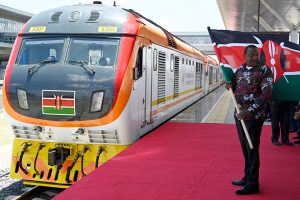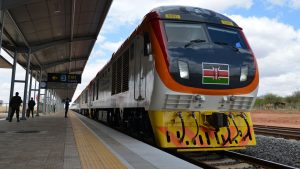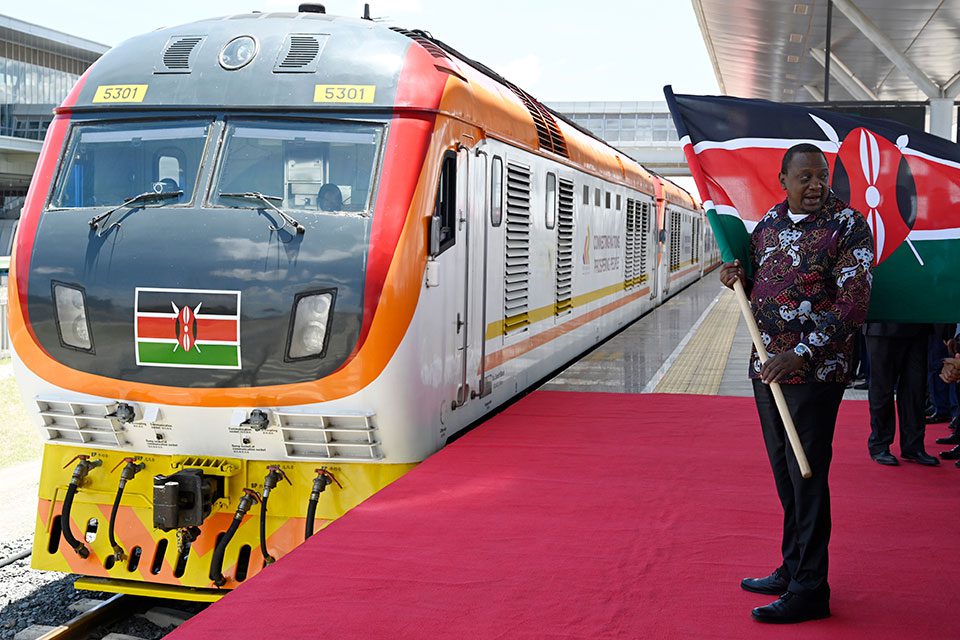The national railway of Kenya; Kenya Railways Corporation (KRC) has begun the procedures for the systematic takeover of operations at the Standard Guage Railway (SGR) from Africa Star Railway Operation Company.

The news is coming at a time when there have been growing concerns about the high operating costs of the Standard Gauge Railway (SGR).
The Chairman of the Kenya Railways Corporation (KRC); Omudho Awitta made it known that the Corporation has already taken over the fueling, security, and ticketing operations of the Standard Guage Railway (SGR) cargo trains and passenger trains. This is part of a deal to completely handle operations of the Standard Guage Railway (SGR) which has been built and funded by China, by May of 2022.
When speaking to Business Daily Africa on Thursday the 5th of March 2021 the Kenya Railways Corporation (KRC) Chairman; Omudho Awitta said, “KRC has not terminated its contract with Africa Star Railway Operation Company (AfriStar). We have negotiated so that we take over the running of the standard gauge railway (SGR).”
Omudho Awitta added that, “The contract between the two parties was to run for 10 years from 2017 with provision clause for review in the fifth year.”
In 2017 Kenya Railways Corporation (KRC) issued a contract to AfriStar which is a subsidiary company of the China Road and Bridge Corporation (CRBC), to handle the maintenance of the Standard Gauge Railway (SGR) and its operations as well.
Included in the contract is that, the operator has the right to manage the ticketing system as well as all associated or hardware and software.
In 2020 the Kenyan government reached a deal with the same subsidiary company of the China Road and Bridge Corporation (CRBC); AfriStar, to take over the maintenance and operations of the Standard Guage Railway (SGR) by May of 2022.
The systematic takeover was to kickstart in July of 2020 with additional functions getting handed over from the 1st of March 2021.

According to the Kenya Railways Corporation (KRC) Chairman; Omudho Awitta, “From March 1, 2021 KRC has taken over all staff working on ticketing function.”
The operating costs of the Standard Gauge Railway (SGR) has been a major concern for a while. Data from the Ministry of Transport in Kenya revealed that taxpayers in the nation, spend an average of 1 billion Kenyan Shillings per month just on operations on the Mombasa to Nairobi railway line.
The cost is estimated to rise up to as high as 1.8 billion Kenyan Shillings as a result of a number of variables like the cost of fuel, the cost of lubricants, maintenance charges, loading fees, unloading fees, management fees, as well as other costs.
The revenue collection being carried out by AfriStar has fallen behind the expenditure of the Standard Guage Railway (SGR), leading to why taxpayers in Kenya continue to contribute to the huge costs of continuing to maintain its operations.
In the three (3) years up until May 2020 the Standard Gauge Railway (SGR) released a total operating loss of 21.68 billion Kenyan Shillings after earning 25.03 billion Kenyan Shillings in revenue in the same period against a total operating cost of 46.71 billion Kenyan Shillings. The gap is what is being filled by taxpayers today.
The operating loss has led to the Kenya Railways Corporation (KRC) defaulting on a payout to AfriStar of around 40 billion Kenyan Shillings.
The operation agreement for the Standard Gauge Railway (SGR) requires the Kenyan government to handle a fixed service monthly payment which will be paid every quarter in advance and at a rate of 28.8 million Dollars.
Beyond the operating fees the East African nation of Kenya also has an obligation to fulfill its repayment of 324 billion Kenyan Shillings. This is the sum it borrowed in May of 2014, from the Exim Bank of China, for the project.
It officially began the repayment process in 2020 after the expiration of the 5 year grace period.
In 2020 the country’s Parliament recommended that the operating costs for the Standard Gauge Railway (SGR) should be reduced by half and the terms and conditions of the loan received to finance the construction, should be renegotiated so as to be able to reduce the pressure on taxpayers.
How informative was this article? Are there any other news topics, categories, or How To topics, that you would like us to write on? Feel free to reach out to Mpesa Pay in the comment section.


